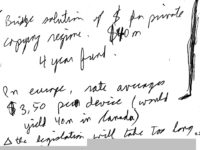Telecom issues were in the spotlight yesterday with the government ordering the CRTC to “examine claims of aggressive or misleading sales practices concerning telecommunications services, the prevalence and impact on consumers, as well as potential solutions.” The Order-in-Council, which was accompanied by a request to the Competition Bureau to provide assistance, follows CBC reports on misleading sales tactics from companies such as Bell and Rogers and the CRTC’s rejection of a request to conduct an inquiry into the matter. The announcement from Innovation, Science and Economic Development Minister Navdeep Bains is a welcome development, signalling the government’s frustration with a CRTC under new chair Ian Scott that has seemingly abandoned consumer interests.
News
Off the Rails: How the Canadian Heritage Copyright Hearings Have Veered Badly Off-Track
The Standing Committee on Canadian Heritage has conducted several weeks of hearings as part of its study on Remuneration Models for Artists and Creative Industries. While the copyright review is the responsibility of the Standing Committee on Industry, Science and Technology, the heritage committee was asked to conduct a study to help inform its work. The mandate was described in the following motion:
Math Not Magic: If Melanie Joly Mandates Internet Taxes, Consumers Will Foot the Bill
The government launched its telecom/broadcast review yesterday and the discussion immediately turned to Internet and Netflix taxes. Despite the wide array of issues ranging from net neutrality to the CBC before the newly established panel, for many the focus of its recommendations and the government response will ultimately come down to whether there are new Internet regulations and taxes established to support the creation of Canadian content.
Canadian Heritage Minister Melanie Joly and Innovation, Science, and Economic Development Minister Navdeep Bains both commented on the issue, suggesting divergent priorities.











